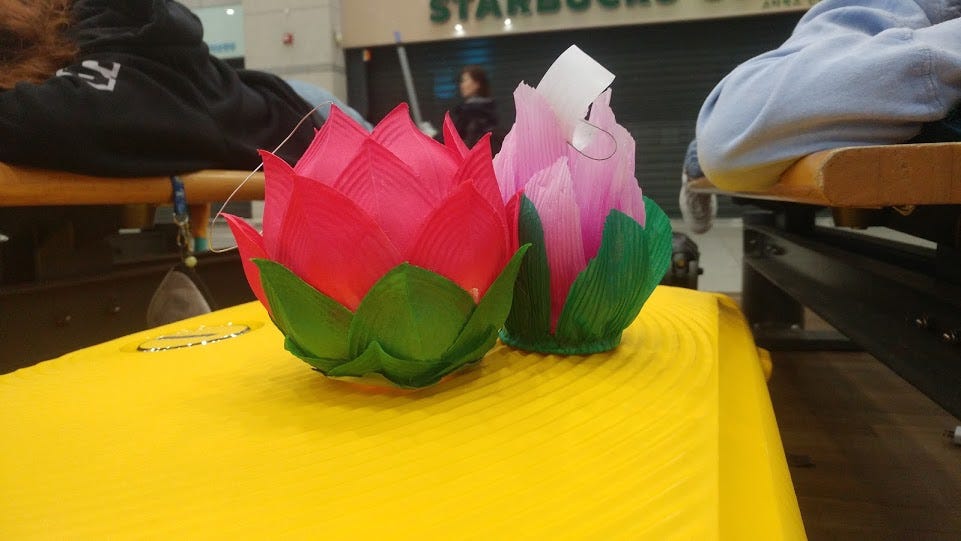Philosophical Introductions to The Net Project #2:
Reading time: 5 min
☛̳𝙁̳𝙞̳𝙣̳𝙞̳𝙨̳𝙝̳𝙞̳𝙣̳𝙜̳ ̳𝙩̳𝙝̳𝙚̳ ̳𝙨̳𝙩̳𝙤̳𝙧̳𝙮̳ ̳&̳ ̳𝙪̳𝙣̳𝙙̳𝙚̳𝙧̳𝙨̳𝙩̳𝙖̳𝙣̳𝙙̳𝙞̳𝙣̳𝙜̳ ̳𝙤̳𝙪̳𝙧̳ ̳𝙣̳𝙖̳𝙧̳𝙧̳𝙖̳𝙩̳𝙞̳𝙫̳𝙚̳𝙨 ̳☚:

The most popular question I get asked about meaning is one you’ve probably heard before: “What is the meaning of life?” As a teenager, I used to obsess about this question. However, my readings and conversations others have taught there’s maybe a better question: “How does the way we think about meaning affect us?” Do the stories we tell ourselves shape us, others, and the world?
The narratives, or stories, we tell ourselves play a role in what we believe is meaningful and important. These inform the way we think about the world and our place in it. Two popular narratives are the orderly narrative and the chaos narrative. To investigate these, I’ll ask you to first imagine yourself with the orderly narrative and then the chaos narrative:
In the orderly narrative, the universe has natural patterns, structure, and meaning. In this narrative, your existence in the universe matters. With a story of order, you could have a persistent urge to uncover your significance and why you exist. In this story enough, you might even obsessively look for meaning or larger explanations where there aren’t any.
In the chaos narrative, the universe is naturally random, disorganized, and meaningless. In this narrative, your existence in the universe is incidental. With a story of chaos, you could feel relief that there is no deeper significance behind existence that needs discovering, and you can just exist. In this story, you might even apathetically disregard the significance of absolutely important or consequential things when they’re there.
I’ll ask you to resist the tempting urge to debate which narrative is true. Instead, let’s turn to the question: “How does my narrative affect me?” To understand how it affects you, we need to explore the deep relationship between narratives and meaning.
Meaning is the “why” behind what you do and why you believe it’s important. Some approaches to meaning can give you a sense of purpose, inspire resilience in the face of challenges, and provide a way for you to look at the universe and your place in it. Meaning can catalyze your identity, values and virtues, motivation, time, and energy. Personal narratives organize your life experiences into a story with yourself as a character, with your approach to meaning explaining why your character interacts with the world in the way it does.
Is there a narrative that can consistently affect us positively? If there is such a narrative, I didn’t find it in my personal lived experiences with the orderly narrative or the chaos narrative.

Growing up, I believed in the orderly narrative: everything happened for a reason and carried significance. I could never simply exist or appreciate a thing for what it was. I was constantly trying to piece together some significance from the experience. Everything that did or did not happen to me was some sign or message from the universe for me to decode. This created a neurotic, exhausting perspective and interpretations that would likely feel ridiculous to others if they heard them.
The job interview, the project, or the date: if it’s something that has a lot of meaning or importance, it can fill us with strong emotions like anxiety, avoidance, and devastation. There can be a hidden belief that we are destined for the perfect career, dream school, or relationship. And when it doesn’t go our way, we may have remarkable resilience with the orderly narrative. “Everything happens for a reason,” we’ll say. I did too until one day I couldn’t keep convincing myself and asked the taboo question: “What if it doesn’t?” This led to chaos narrative.
If you believe the orderly narrative, you might relate to a great deal of this. If you don’t believe in the orderly narrative, it might seem unbelievable that others identify in this way, but in my conversations, I learned a great many do.

Embracing the chaos narrative, I became convinced I would no longer deceive myself so readily. There was a cynical relief to respond to something unfortunate with “nothing matters anyway” It was initially a freeing response to things that had before felt too meaningful or important. I observed others around me also use it. Business meeting didn’t go our way? An exam or date didn’t go our way? Does it matter? No, nothing does.
But meaninglessness (“Nihilism”) is not a treatment without side effects. For one, you can become cynical when faced with any challenging task or setback, believing it isn’t worth the effort and ultimately doesn’t matter. Also, consider what might happen if things do begin to go your way. We can’t easily switch from telling ourselves nothing matters in response to undesired outcomes to telling ourselves things do matter in response to desired ones. When we tell ourselves nothing matters enough times, we begin to believe it. It can get to the point where our experiences feel dulled due to the inability to acknowledge any meaningfulness. This belief robs us of the ability to discern what matters from what doesn’t. It robs us of the chance to learn from outcomes that don’t go our way and from how to navigate our anxieties around things that matter to us.
When meaninglessness gets adopted as our Meaning of Life (MOL), it comes with detrimental mental and physical health outcomes. To someone whose life feels full of meaning and purpose, this experience might feel puzzling and difficult to understand. In my own life and from the conversations I’ve shared, the nihilistic narrative of meaninglessness sometimes provides an immediate sense of release from overwhelming burdens. However, this initial catharsis shifts into depression, loneliness, and frustration. During my nihilistic period, I found myself retreating to feelings of despair, isolation, and irritation. When your responsibilities have lost meaningfulness, you question the purpose of your days. You might even go so far as to question if the people around you–and their narratives–matter. And unfortunately, when you start to tell yourself that nothing matters, you begin to question if you matter.
If neither the orderly narrative nor chaos narrative can consistently affect us in a positive light, is there a narrative that can? To quote a friend I had made during my research travels: “Sometimes some things can happen for a reason.” I’ve personally adopted this as my perspective and present narrative on the world. Sometimes some things happen for a reason. I don’t have to investigate everything that happened as some sign from the universe. But I could choose to investigate the things that felt significant. I could choose my own approach to meaning (what philosophers call “Existentialism”). For things that didn’t feel important, I could simply let them go. And for many other things, I could appreciate that it gave me personal meaning without needing to place its importance in the grand scheme of the universe. We can call this the “sometimes narrative” unless someone thinks of something catchier.

There’s nothing meaningful at the beginning. We are not in a life with inherent meaning, you have to find something to make it interesting. That could be a lot of things. One meaning of life could be to be moral or good to people. Other people could think it is to learn a lot, or maybe give something to their children. Everyone needs to find meaning to be satisfied with their life at the end.” - Camille (France), 26, SeoulWe’ve made progress, but we still haven’t fully answered every question on these topics. Some of these questions you’ll have to search and investigate the answers for yourself. Luckily, you can do so at The Net Project. Our platform helps people create coherent, positive narratives in their life, so anyone can making sense of their meaning and all the ways it affects them.
There’s much more to say about the subject. I can write follow-ups on Existentialism, its critiques, and on how we can resolve them for an approach to meaning that lets humanity flourish and thrive. Other areas of interest worth exploring are the intersection of meaning and topics like escapism, art, authenticity, technology, AI, and more.
As other volunteers and I continue working on the nonprofit, we strive every day to raise awareness about the Meaning Crisis and address it. I left my job in December 2022 to do so full-time. If you want to join our mission or contribute to making it financially sustainable, you can reach out at flourishing@netproject.org, and you’ll hear back from me directly.
Last edited in July 2025 for clarity and small updates as part of our website and blog migration.
Dictionary:
Personal narratives organize your life experiences into a story with yourself as a character, with your approach to meaning explaining why your character interacts with the world in the way it does.
Existentialism is the world philosopher use to describe choosing one’s own approach to meaning

